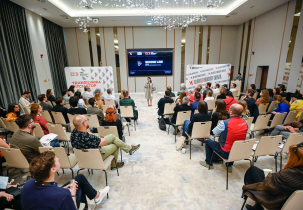
Christine Ott: “When you make a cine-concert you have to respect the film.”
Christine Ott will deliver her cine-concert Tabu today at 9 p.m. at the Student House. She was very impressed with her first contact with Cluj and TIFF and she agreed to tell us more about her cine-concerts and her unusual instrument.
When did you start performing cine-concerts in film festivals?
I started three years ago when I created Tabu from Murnau and after that the film festival in La Rochelle asked me to create music for Flaherty’s Nanook of the North so I did it in duet with Torsten Böttcher who also plays for Tabu for the hunt part.
You have experience in creating original music for film. What are some of the challenges?
It is very interesting. It allows you to get a first impression of the images. I had the chance with one film from director Roland Edzard – La fin du silence, which was screened in the Cannes festival. It was very interesting to work from the beginning, from the writing of the film, to the end. It is very different than composing for yourself or for an album. It’s really about getting inside a story and a particular world.
What about the eccentric electronic instrument you play, the Ondes Martenot? What do you like about it?
It’s a love story. This instrument has a very interesting history. I won’t talk about it. It would take two weeks. It’s a marvellous instrument. It’s really avantgardist. I love the sculpture of the sound. It can go from very deep, dark sounds to the sky. When I talk about music, I tend to talk about it like a painter or sculptor because it’s an instrument that I think can sculpt the sound. It’s influenced my playing of the piano a lot.
It is often said that cine-concerts are risky and preparing one is delicate work. What is your vision about developing cine-concerts?
Excellent question! I will be very direct. It’s very dangerous territory. I began to make cine-concerts because I fell in love with images and with film. There are so many wonderful films. It was after my collaboration for La fin de silence that I saw a lot of different cine-concerts and I think sometimes it’s a pity that musicians just use the film to promote their own music. Yes, they music is well played, but it has no respect for the film. You have the feeling they are making cine-concerts like a solo. It’s very trendy to have video, images, but sometimes you don’t know if they really love the image, the movie. For example, I am in love with Tabu. Some musicians have eighty films in their catalogues. How can they do this? Maybe they are geniuses and I am not. I was at the film festival in Tübingen and I met a journalist from Cahiers du Cinema and I was very honoured about what he said about Tabu – he said “you really respect the film”. Sometimes musicians devour the film, they take it over, they erase the film because the music is too heavy. I try to follow the film, not to make performance. I want to respect the film.
Why did you choose Murnau’s Tabu?
I saw lots of films. At first I was not sure about using my instrument, Ondes Martenot. I play other instruments –Indian harmonium, toy piano. People asked me why I didn’t choose Nosferatu. Because I think it’s too much with the eerie sound of the Ondes. I didn’t want to make what everybody was waiting for. I was looking for a very good film, a chef-d’oeuvre, but maybe not so played. Murnau is fantastic and someday I would like to make Sunrise, but I’m still waiting because it’s so beautiful. It’s a nice struggle to take hidden jewels and make contemporary music for them. It’s also a discovery.
What is the most interesting thing that happened to you in a cine-concert?
In Germany, at the end of the concert, a little child came to me and asked me “Do you think Matahi is really dead?” and I was very emotional because when I play, in my head, I also think maybe he’s not dead.
Interview by Radu Meza
Article published in AperiTIFF.





